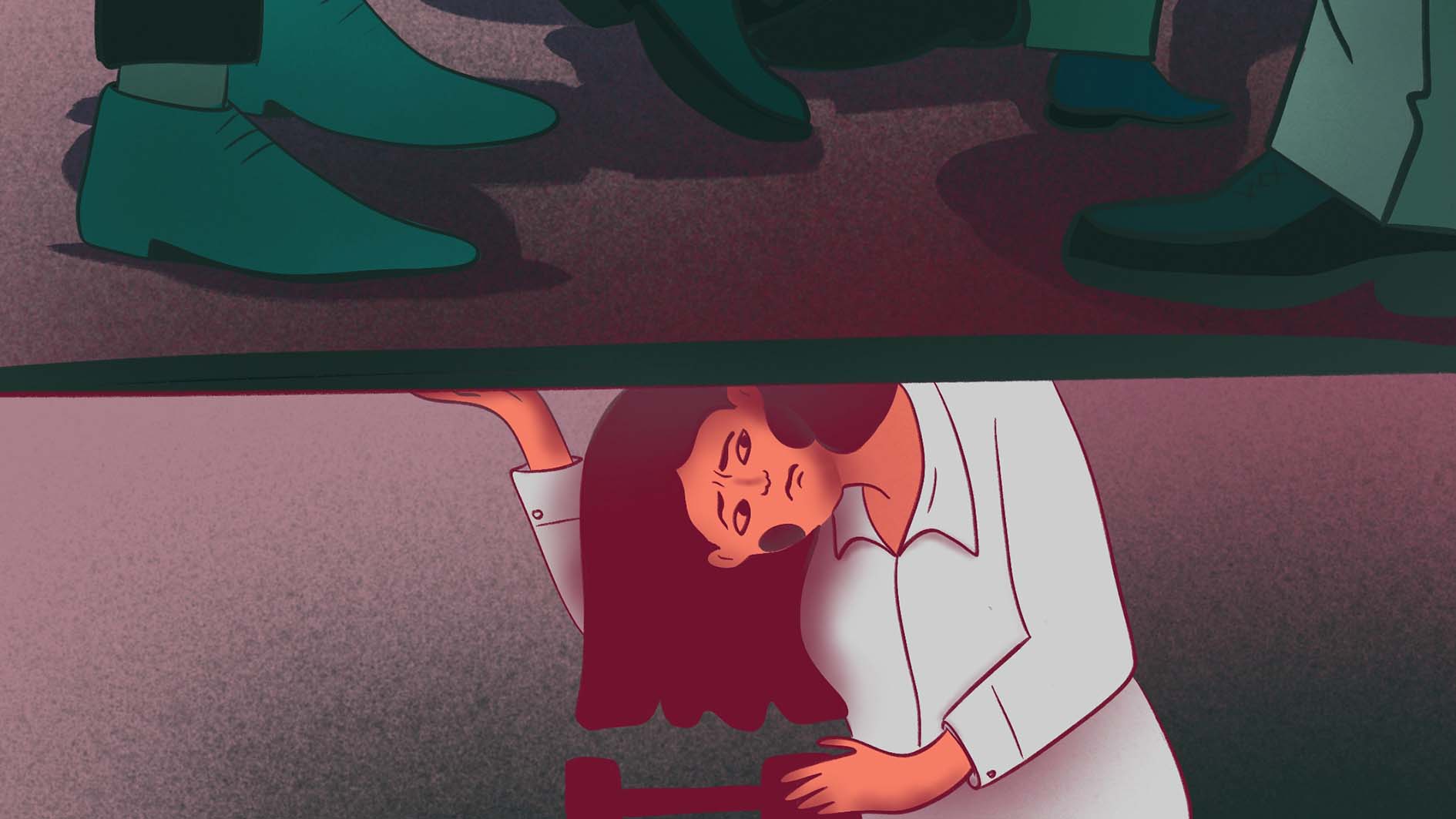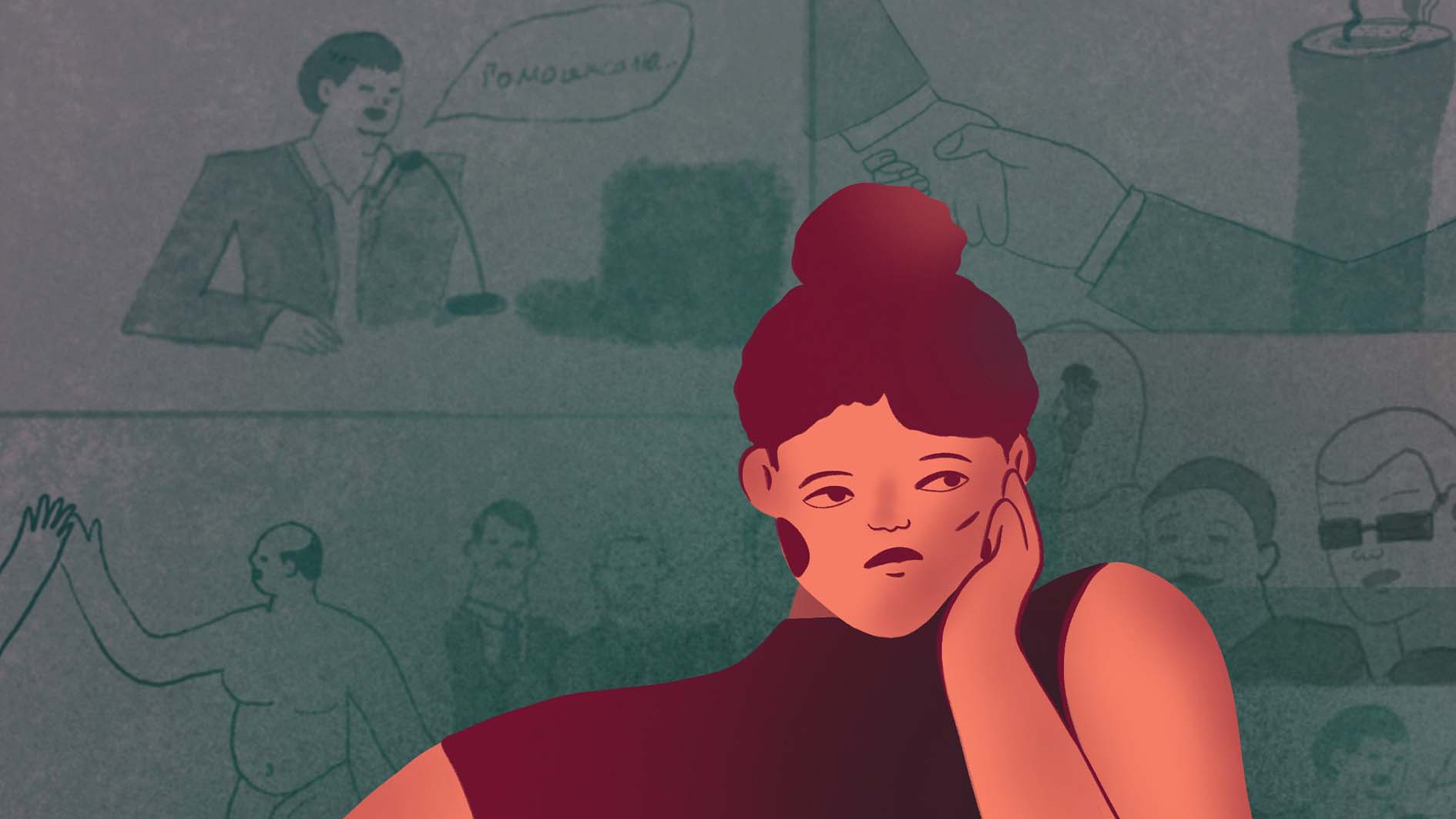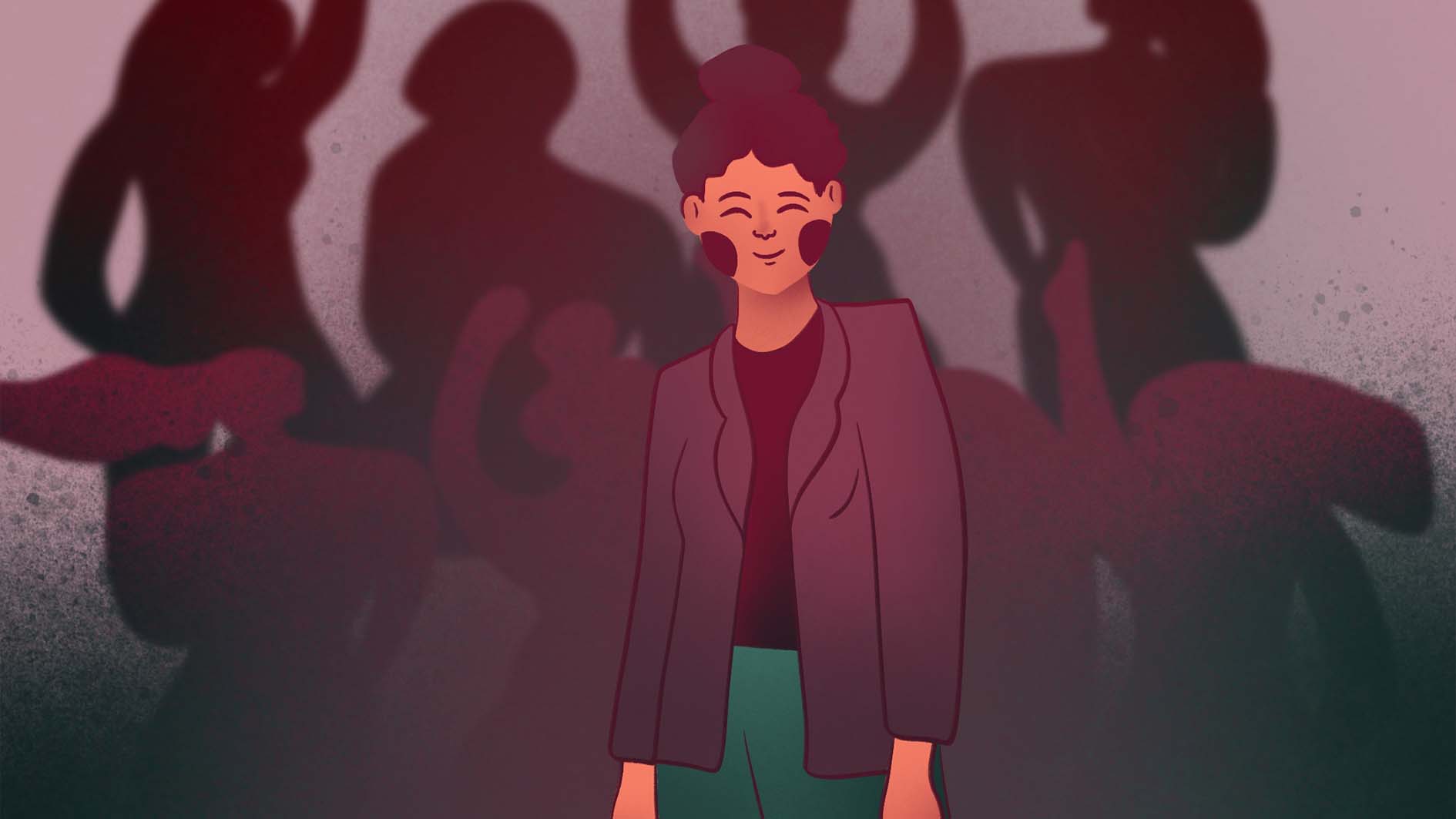Women in Kyrgyzstan are increasingly less likely to be appointed to senior management positions in the country. Kloop investigates the reasons behind this phenomenon and its potential consequences.
This article was created with the support of Mediaset.
An elegantly dressed woman enters Kloop’s editorial office. She’s wearing a stern black suit and a multicolored scarf tied in a bow on her neck. She takes her time walking through the desks, greets the journalists, and steps into a room for an interview. This is Elvira Surabaldieva—one of the few women working in Kyrgyzstan’s government.
In 2004, Elvira Surabaldieva joined the civil service for the first time — she landed on the Social Fund. According to Elvira, she had always wanted “to serve the government,” and after she had finished her studies abroad, she decided to apply to work in one of the government agencies.
“A friend of mine was working in the Social Fund, we crossed paths one day, and I told her about my wish to join the civil service. I’ll apply, and I’ll go wherever they accept me. My friend let me know about a vacancy for a senior specialist in the Social Fund, so I went and applied there. They accepted me”, — says Elvira Surabaldieva.
In almost 20 years, Elvira Surabaldieva was able to work in the parliament’s VI convocation and in the government, and she was able to lead the Republican Headquarters for the fight against coronavirus during the country’s most difficult time — Kyrgyzstan was in a political crisis after the regime change in October 2020. However, not all women are actually able to make a career in the executive branch.
With each year there are fewer and fewer women in power
Since the mid-90s fewer and fewer women have been in management positions — this has been shown in several investigations. In 1996, there were six female ministry managers in the Kyrgyz government — 36% of all high-ranking officials. In 2001, that number dropped to 24%, and by 2008 it had already dropped to 15%.
After the revolution of April 7, 2010, a woman — Roza Otunbayeva — led the country for the first time. Even though there were not any female ministers in Otunbayeva’s government, these ministers represented her in the parliament and the government. On December 1, 2011, Almazbek Atambayev replaced Roza Otunbayeva as president.
The data collected by Kloop indicates that since 2011, presidents have appointed an average of two to three women to senior positions in the government at various times — in total, in ten years there were about twenty women. Women mainly occupied the posts of Deputy Prime Ministers and directed the Health, Education, Finance, and Justice Ministries.
The latest contingent of the Cabinet of Ministers,* which was appointed in October 2021 by President Japarov, is one of the worst in terms of female representation. Of the Cabinet’s twenty members, only one is a woman —Dinara Kutmanova who led the new Ministry of Natural Resources, Ecology, and Technical Supervision.
*Since 2021 the government of Kyrgyzstan has been called the “Cabinet of Ministers.”
Women have practically never been heads of oblasts. In the history of contemporary Kyrgyzstan, there have only been four female governors, while there have been over 100 male ones.
These women were powerful representatives in the Batken, Talas, Jalal-Abad, and Issyk Kul oblasts. Two of them were appointed to their positions after the April revolution of 2010. However, each of these women already had extensive work experience in the civil service.
Among the mayors of cities of republican significance, i.e., Bishkek and Osh, there has not been a single woman at all. They have become vice mayors and have mainly managed social problems. However, in the last 10 years, less than 20% of all vice mayors have been women.
Senior positions for men, lower positions for women
There are significantly fewer women than men in senior government positions all over the world. There are only a few countries where female ministers outnumber their male counterparts — these are primarily in European countries and in Canada, but this is also the case in the Latin American country of Nicaragua and the African country of Rwanda.
At the same time, in many countries of the world, women hold less than 20% of ministry posts. Kyrgyzstan is located at the very bottom of this ranking with its singular female member of the Cabinet of Ministers.
One of the reasons for this inequality is the so-called “glass ceiling,” an invisible barrier, unrelated to a woman’s professional abilities, which limits her career advancement.
This barrier is caused by deeply ingrained stereotypes about how a woman cannot be a good leader and how her main mission is to have children and take care of the household. These stereotypes cause women themselves to act less ambitiously.

We analyzed the country’s State Personnel Service data from 2017 to 2021 and found out that there is indeed a “glass ceiling” for female officials in Kyrgyzstan: the higher the positions, the fewer women there are.
Even though a relative parity between women and men is maintained at the level of junior positions — 47% women to 53% men — at more senior levels the number of women is reduced to 11%.
Working while constantly trying to prove that you are “worthy”
After working for five years in the Jogorku Kenesh, Elvira Surabaldieva again returned to the government, but this time as a Deputy Prime Minister, and headed the Republican Headquarters for fighting Covid-19.
Surabaldieva says that in order to remain in the civil service a woman needs to exert significantly more effort than a man because of the increased attention to everything that she does.
“When it’s enough for a man to make 25% of an effort, a woman would need to make 250% of an effort. Women are viewed skeptically, especially when men have to follow their orders”, — Surabaldieva adds.
One of Kloop’s sources, who has worked in the government for a long time, agrees with Surabaldieva. According to her, a woman always must prove that she is “worthy” to hold her position.
The Kyrgyz political world is a man’s world with its own rules and ways of solving problems (a “dinner of plov” or “Friday in the banya” where everything is solved more quickly and where women are not allowed.)
There is a myriad of examples of men negotiating entire government resolutions while going for a smoke, and even signing them right on the spot.
These invisible barriers also included informal rules of the game; for example, it is impossible to get a meeting with key players in the parliament and in the government for several months if an official is unknown in the Cabinet of Ministers. Sometimes questions are intentionally and publicly ignored at meetings.
Even the absence of an invitation to important family events in political high-society matters. Proudly ignoring “petty things” like this further causes the issues that women bring up in the government to go unresolved for long periods of time.
Meanwhile, women must also combine work with domestic duties. In Kyrgyzstan, working women do three times as many household chores as working men.
Women often even choose a specific profession and workplace, so that they can spend less time commuting and still be able to do household chores.
“It’s easier for men. Women have families and children, it’s very physically demanding for them. My parents practically never saw me. I would wake up, leave, come home at night, eat breakfast at work, cookies, coffee, ten meetings in a row. It’s physically very difficult for a woman who is career-oriented”, — Elvira Surabaldieva adds.
Don’t smile and watch what you say

Harassment — another problem that female officials face in Kyrgyzstan.
The majority of sexual harassment cases happen in governmental institutions — this has been demonstrated by the results of a 2019 investigation conducted by the Kyrgyz Association of Female Judges.
877 women from four cities in Kyrgyzstan participated in this investigation. It was found that one out of every four women polled had encountered harassment.
The study showed that sexual harassment was committed by mid and senior male managers. Young ordinary female employees were most often the victims of harassment.
“On average, the level of sexual harassment is much higher (80%) in governmental institutions compared to private organizations. The women polled believe that this is due to the ability of politicians and others in positions of power to evade punishment because of their connections in law enforcement agencies”, — as stated in the study’s conclusion.
This investigation’s conclusions have also been confirmed by an anonymous source for Kloop.
According to her, harassment and assault happen “openly” in the Kyrgyz government. Men in power are not shy about blatant physical harassment at work.
“Women, including managers and specialists, create a whole plan of positioning themselves in certain ways, carefully choosing a cloakroom, trying not to smile, watching what they say. Additionally, it’s ‘undesirable’ to be alone for a long time in someone’s office. There are many cases when baseless rumors destroyed the reputations of many women who couldn’t prove that ‘nothing wrong happened”, — the source adds.
The “washing out” of women from power affects everyone
Back in 2006, President Kurmanbek Bakiyev signed an order recommending that women be appointed to no fewer than 30% of management positions in government agencies. But since that was not an obligatory measure, the quota was not achieved.
In a 2013 study of the violation of women’s political rights, it was shown that in Kyrgyzstan there is a “tendency to ‘wash’ women out” of the sphere of management, which results in the concept of a “female manager” being forgotten. Instead, the stereotypes of “women are bad leaders” and “it’s better for a woman to take care of the household” are reinforced.
In the last 10 years, Kyrgyzstan has done the least of all the post-Soviet republics to reduce inequality between women and men. For example, in Kazakhstan, the gender inequality index — an indicator assessing women’s access to healthcare, political life, and the labor market — decreased by a factor of 3, in Armenia by a factor of 2.3, but in Kyrgyzstan only by a factor of 1.5.
When asked by journalists from Kloop about why there is only one woman in the current Cabinet of Ministers, the presidential administration answered that the problem is the lack of gender quotas.
“We are just now developing [gender quotas] …. The law [currently] does not provide a quota for women, so we are actively trying to implement that now”, — said the presidential administration.
They also reported that they are proposing to introduce a standard quota of 30% women in all positions of the executive branch into the National Strategy for General Equality by 2030. But this document is still being developed.
The presence of women in power and in politics signals to other women that the civil service is not just a “man’s game.” Women in power become role models for other women, increasing their ambitiousness and self-confidence.

According to data from a World Bank study, women’s inequality in economic life decreases the global GDP by 15%. Additionally, the lack of women in power cuts out a whole layer of issues from the political discourse. These are topics that are traditionally considered “women’s issues:” the rights of children, the elderly, large families, and other socially vulnerable groups. For example, in the US it was women who achieved the adoption of maternity leave and paternity leave.
“If we’re talking about the parliament, men only start to raise social issues, like schools and roads, when it’s close to elections. But women raise questions about social problems all the time because women are unable to be fully functional workers due to inadequate infrastructure—when there are no daycares, schools, etc. Men don’t take care of kids, don’t take them to school, don’t raise them, so it’s as if these issues don’t concern them”, — says Surabaldieva.
Currently, the positions of Chairman of the Cabinet of Ministers (the prime minister) and three of his deputies, including the head of the “traditionally female” social block, are occupied by men.
Meanwhile, in Kyrgyzstan, there are plenty of women with significant work experience in the social sector — Altynai Omurbekova, Aliza Soltonbekova, Cholpon Sultanbekova. All of them have previously held management positions.
Edil Baisalov the current Deputy Chairman of the Cabinet of Ministers on social issues has a year’s worth of experience as the Deputy Minister of Social Development in 2012 and two years’ worth of experience as the ambassador to the United Kingdom. However, in the opinion of the presidential administration, that is sufficient.
Authors: Saviya Khasanova, Munduzbek Kalykov
Data collection and analysis: Saviya Khasanova, Munduzbek Kalykov
Interview: Anna Kapushenko
Editors: Anna Kapushenko, Aziza Raimberdieva, Ekaterina Reznikova
Illustrations: Aleksandra Titova
Layout: Aidai Irgebayeva, Islam Roziev
Translated by Taylor Wilson from Respond Crisis Translation


